Heinz Skyte
Heinz Skyte was born in Germany. His family fled the Nazis and came to Britain where they were interned as ‘enemy aliens’.
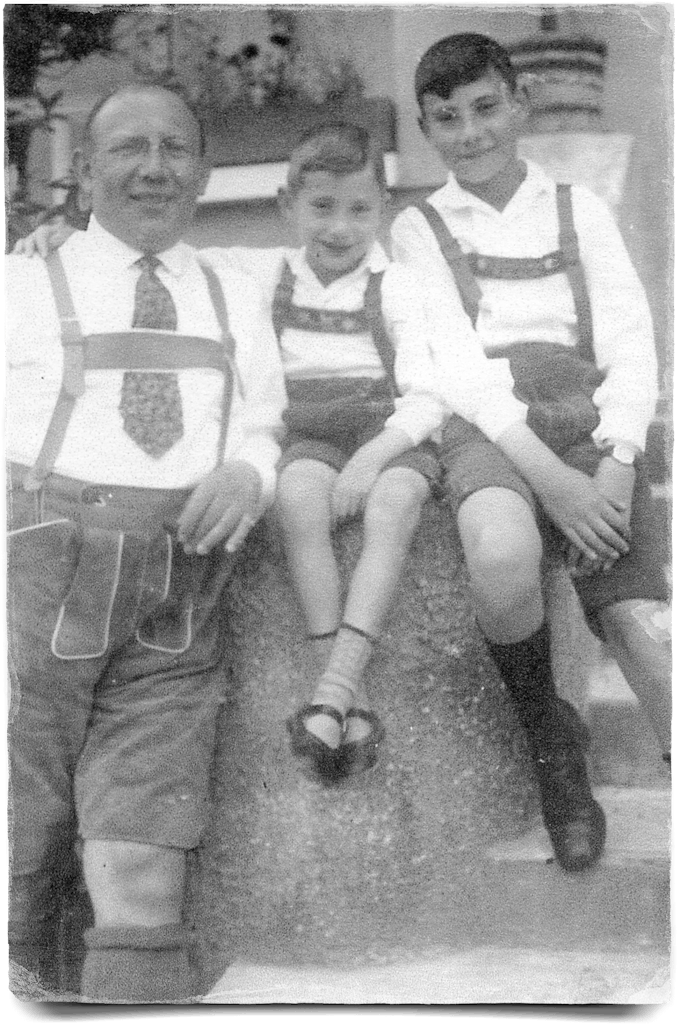

Heinz Skyte was born in 1920 in Fürth, outside Nuremberg, where his family ran a wholesale and retail textile business specialising in curtains and floor coverings. Heinz’s family belonged to a Reform synagogue, attending some services on Sabbaths and festivals, but were not religious and did not follow strict dietary laws at home.
After attending a private primary school, Heinz went to the local German grammar school (Humanistisches Gymnasium), which specialised in the classics but with no science tuition or modern languages. Heinz said that he cried bitterly on his first day at school, and hated school ever after.
Heinz remembered the Nazis coming to power in 1933 just two weeks before his 13th birthday. As Nuremburg was the ideological base for the Nazis, support for antisemitism was strong in the area. Nazi parades marched down the streets, passing Heinz’s second floor apartment:
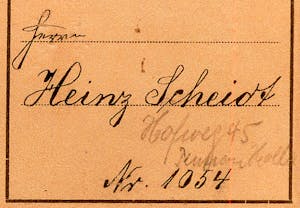
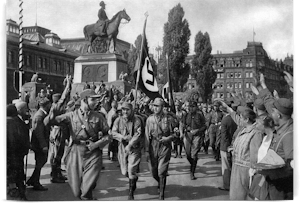

“The Nazis celebrated their coming to power by torchlight processions… I remember them coming past with their torches singing antisemitic songs.”
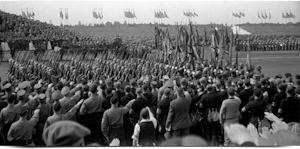
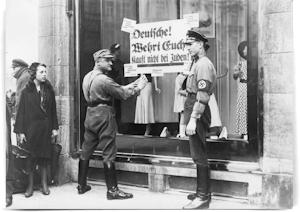

Although Heinz recalled the general view being that the National Socialist party was a passing phase that wouldn’t last, he remembered the boycotts of Jewish shops, including his family’s, and the growing segregation of social life. This also meant that Heinz, as a Jewish boy, was banned from the town’s sports clubs. He loved athletics and he joined a Jewish sports club where he competed in the high jump, long jump, triple jump, 100 metres and 200 metres.
By 1935, Heinz was one of only three Jewish boys to remain at his grammar school. He recalled an episode in which the Hitler Youth leader told them to leave: “We don’t want Jews here”. However, the boys continued their studies with the support of their families and non-Nazi school friends.
Also in 1935, Heinz’s older brother, Frank, fled Germany after a Nazi Party representative where he worked reported him for having a relationship with a non-Jewish girl. Frank escaped to Switzerland before receiving a permit to travel to Manchester. He then moved to Leeds.
In 1938, Heinz was taking an intensive English language course in Hamburg, while the family tried to find a way to get him out of Germany. On 9 November, Heinz witnessed the violent pogrom known as Kristallnacht (or the November pogrom). He was woken by his landlady at about 4am and told that there was a phone call from his mother. His mother told him “Father’s gone away,” which was code for “he’s been arrested”; she told Heinz to “go for a walk” immediately. Heinz spent the next 16 hours walking the streets, and saw the synagogues burning, smoke everywhere and groups of Jews being rounded up and marched through the streets. His mother’s advice to go for a walk saved Heinz from being arrested. Heinz’s father was kept in Dachau for nearly six weeks and was released a traumatised man.
After Kristallnacht, it was clear that the family needed to leave Germany. However, due to immigration laws there were few options available. Frank, now living in Leeds, secured Heinz a trainee post at a clothing factory and Heinz flew from Hamburg to Croydon, London in February 1939.
The very first thing Heinz did on arrival at Leeds station was to leave his luggage and take a bus to Elland Road with his brother to watch Leeds United draw 1-1 with Everton. The passion for Leeds United stayed him for the rest of his life.

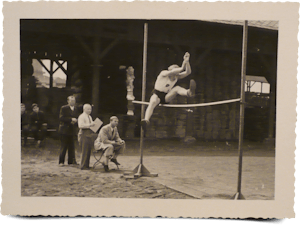

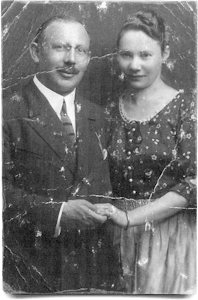


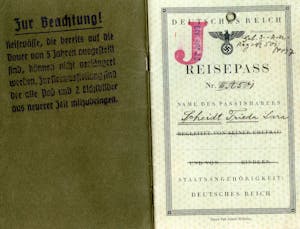
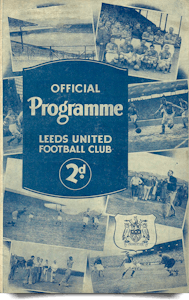
“I learnt quite a lot of English (at college in Hamburg) and…We were going to Elland Road on a tram … I tried to listen to what they were saying (but) I couldn’t understand one word, it was broad Yorkshire….I thought my god I’ve wasted my time at college (laughs).”

Heinz settled into his new job and the brothers worked hard to secure their parents a way out of Germany. Frank and Heinz managed to get visas for their parents, who arrived in England on 27 August 1939, just four days before Germany invaded Poland and the Second World War began.
On the outbreak of war, any Germans living in England immediately came under suspicion despite their circumstances. The British Government categorised them as either Category A ‘Friendly Aliens’ or Category B ‘Enemy Aliens’ according to the threat they were thought to pose. In Leeds, all Germans, including Jewish refugees, were classed as Category B ‘Enemy Aliens’.
On 16 May 1940, Heinz, his father and brother were interned in the Isle of Man. After about a month, Heinz and Frank were shipped to Quebec, Canada, where they remained until August 1942. When they arrived in Canada, they discovered the guards had been told that they were German parachutists, so they were treated poorly. Although Heinz said that he understood the reasoning behind the British and Canadian internment policies, he nevertheless resented it:
“In Germany we were kicked out because we were Jews, here we were interned because we were Germans.”
On his return to England in August 1942, Heinz returned to his former job as a presser before volunteering for war work, and becoming an engineer’s fitter. In Leeds, Heinz met and married Thea, a fellow Jewish refugee who had arrived in England with the Kindertransport. Heinz and Thea were granted British citizenship in 1947.
In 1951, Heinz was invited to work for the Leeds Jewish Welfare Board and the Leeds Jewish Housing Association, where he remained for the rest of his career, retiring as the Board’s chief executive.

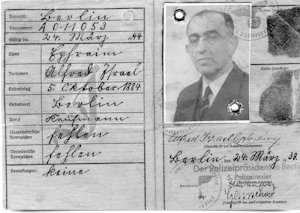
In 1976, Heinz received his MBE in recognition of a lifetime of dedication to community work. One of the Leeds Jewish Housing Association buildings is named in his and Thea’s honour. Continuing his dedication to the Jewish community and commemoration of the Holocaust well into his retirement, Heinz was instrumental in setting up the Holocaust Survivors’ Friendship Association. He spoke about his life to schools all over the country.
“Everybody thought the Holocaust was unique, which it was at the time, although it wasn’t the first, and everybody said ‘never again’, but it’s still happening.”
Heinz passed away in 2020 aged 99 and is very much missed by his family, friends and the Centre.


Can you help us?
Without the work of charities like ours, stories like this one will be lost and forgotten. Please donate generously to ensure that this story can a force for good in the modern world.
- £
